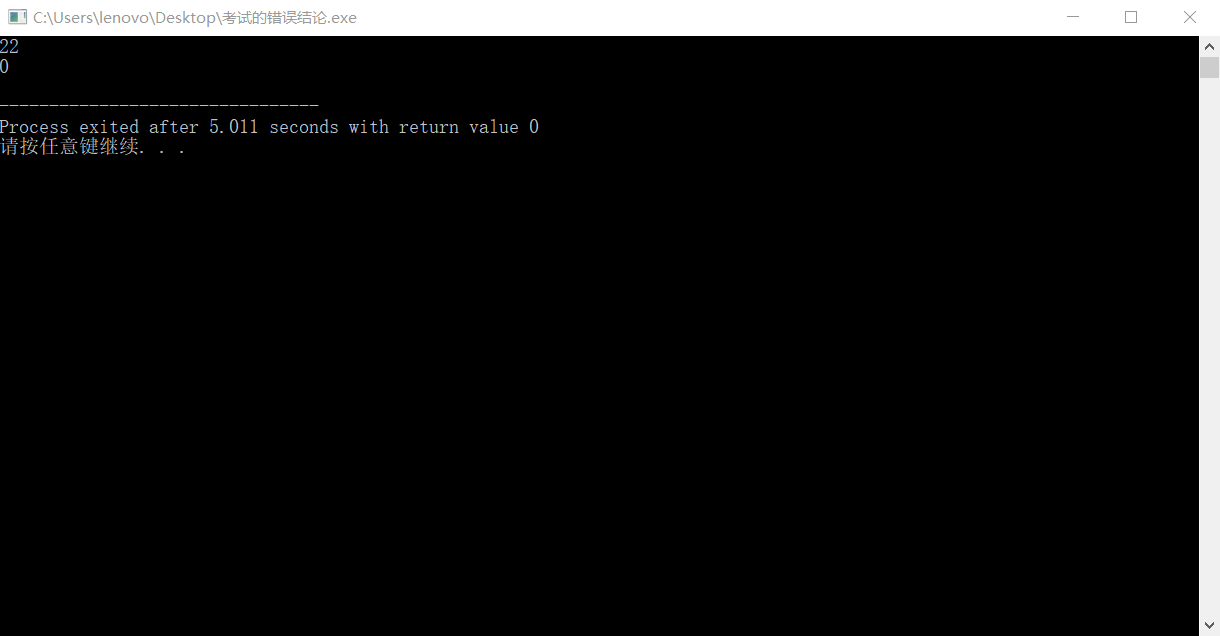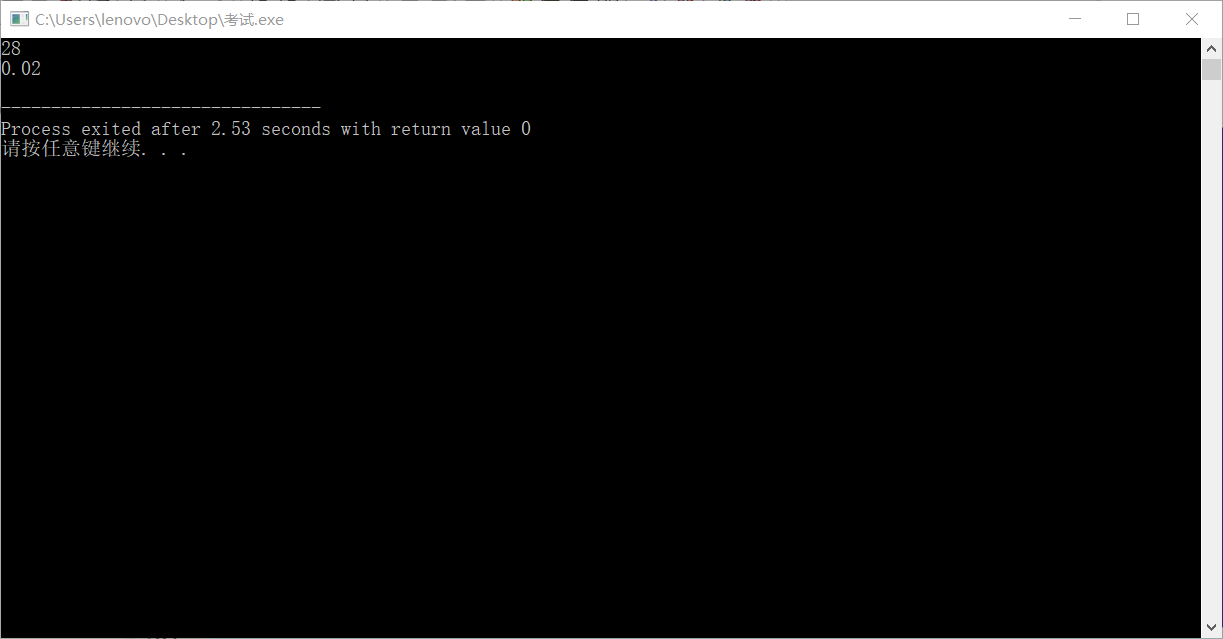随机数
以前通过书和资料,看到了定义随机数的两种形式,就自认为自己理解透了,会用了。可是考试之后才发现自己的理解只是表面,并不透彻。
首先是先说一下刚开始对随机数的浅层理解(这里就用前边的实验来举例子)
第一种就是用书上定义种子seed的方法
#include <iostream>
#include <cstdlib>
using namespace std;
int main()
{
int x;
unsigned seed;
srand(seed);
int number=rand()%100+1;
cout<<"猜一下这个数: ";
cin>>x;
while(1)
{
if(x!=number)
{
if(x<number)
{
cout<<"小了"<<endl;
}
else
{
cout<<"大了"<<endl;
}
}
else
{
cout<<"恭喜猜对了!"<<endl;break;
}
cin>>x;
}
return 0;
}
以seed为种子的时候,我发现每次电脑给出的随机数貌似都是一样的,如果想不一样的话呢,参照一些资料,我发现可以以时间为种子,这时候要定义一个头文件<time.h>
这时候程序如下:
#include<iostream>
#include<cstdlib>
#include<time.h>
using namespace std;
int main()
{
int x;
srand(time(0));
int number=rand()%100+1;
cout<<"猜一下这个数: ";
cin>>x;
while(1)
{
if(x!=number)
{
if(x<number)
{
cout<<"小了"<<endl;
}
else
{
cout<<"大了"<<endl;
}
}
else
{
cout<<"恭喜猜对了!"<<endl;break;
}
cin>>x;
}
return 0;
}
这是我在这次考试之前对随机数的理解
考试的第一题呢,我当时看到是随机数就很开心,然后比较自以为是的用time.h的头文件写了以下程序
#include<iostream>
#include<cstdlib>
#include<time.h>
using namespace std;
class Dice{
public:
Dice(int n):sides(n){ };
int cast()
{
srand(time(0));
int number=rand()%6+1;
}
private:
int sides;
};
int main()
{
int x;
float count;
cin>>x;
Dice a(40);
for(int i=0;i<=500;i++)
{
int s= a.cast();
if(s==x)
count++;
}
float c=count/500;
cout<<c<<endl;
return 0;
}

程序一直是错的,就很崩溃,考试的时候呢,也没时间多想。考试之后经过查资料和思考,才知道运用time.h头文件的时候,那个参数time(0)是相当于当前时间,所以for函数运用这个随机数的时候,时间都是一样的,相当于参数都是一样的,所以才会错
所以我把程序改成了以下的样子
#include<iostream>
#include<cstdlib>
#include<time.h>
using namespace std;
class Dice{
public:
Dice(int n);
int cast()
{
int number=rand()%sides+1;
return number;
}
private:
int sides;
};
Dice::Dice(int n)
{
sides=n;
}
int main()
{
int x;
float count=0;
cin>>x;
Dice a(40);
for(int times=0;times<=500;times++)
{
srand(times);
int s=a.cast();
if(s==x)
count++;
}
float c=count/500;
cout<<c<<endl;
return 0;
}

结果呢还是不太对,每次运行的时候概率都是一样的,这就相当于一个伪随机数吧,因为系统运行是很快的,所以根据同学和老师的建议我又改动了这个程序
#include<iostream>
#include<cstdlib>
#include<time.h>
using namespace std;
class Dice{
public:
Dice(int n);
int cast()
{
int number=rand()%sides+1;
return number;
}
private:
int sides;
};
Dice::Dice(int n)
{
sides=n;
}
int main()
{
int x;
float count=0;
cin>>x;
Dice a(40);
srand((unsigned)time(nullptr));//放在外边就可以了,因为放在循环里面的话,系统运行的太快了,时间都差不多
for(int times=0;times<=500;times++)
{
// srand((unsigned)time(nullptr));
//srand(times);这是我原来写的,这个其实也相当于一个伪随机数
int s=a.cast();
if(s==x)
count++;
}
float c=count/500;
cout<<c<<endl;
return 0;
}
或者改成这个样子
#include<iostream>
#include<cstdlib>
#include<ctime>
//#include<time.h>
using namespace std;
class Dice{
public:
Dice(int n);
int cast()
{
int number=rand()%sides+1;
return number;
}
private:
int sides;
};
Dice::Dice(int n)
{
sides=n;
}
int main()
{
int x;
float count=0;
cin>>x;
Dice a(40);
for(int times=0;times<=500;times++)
{
srand(times);
int s=a.cast();
if(s==x)
count++;
}
float c=count/500;
cout<<c<<endl;
return 0;
}
这样改掉头文件也对了
终于把程序改对了,同时呢,对于随机数也加深了理解,以后再运用的时候也会更加自如了




